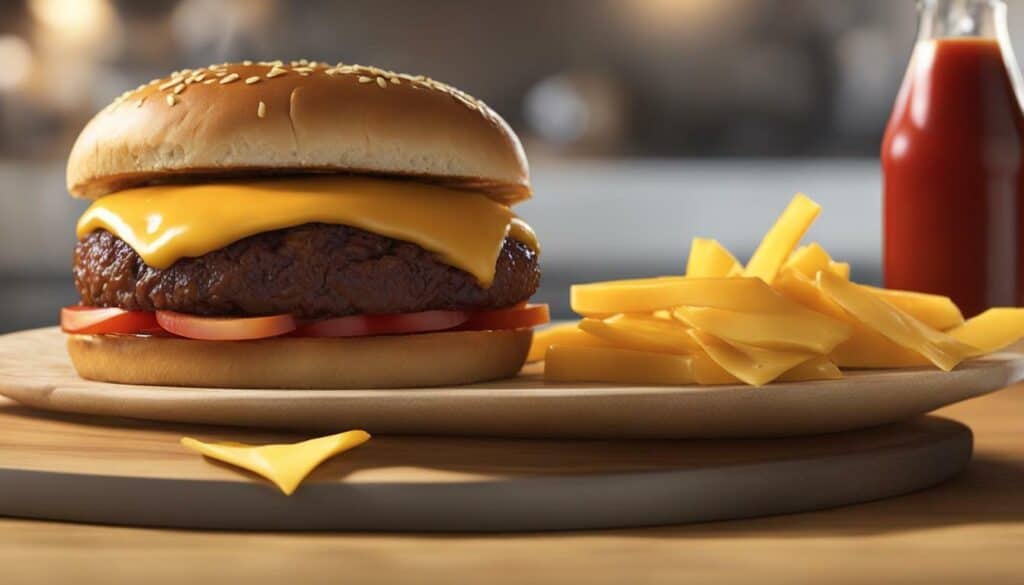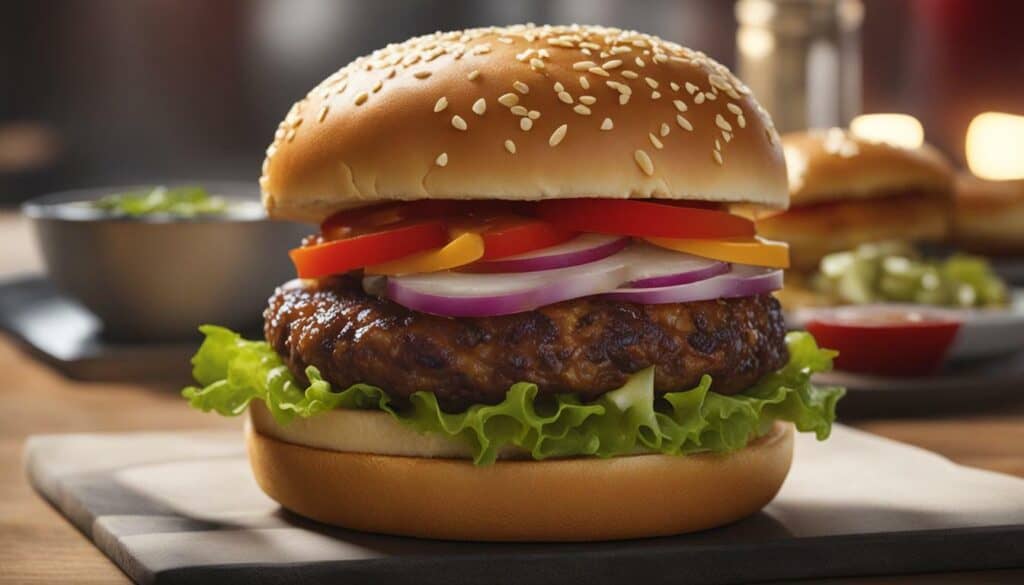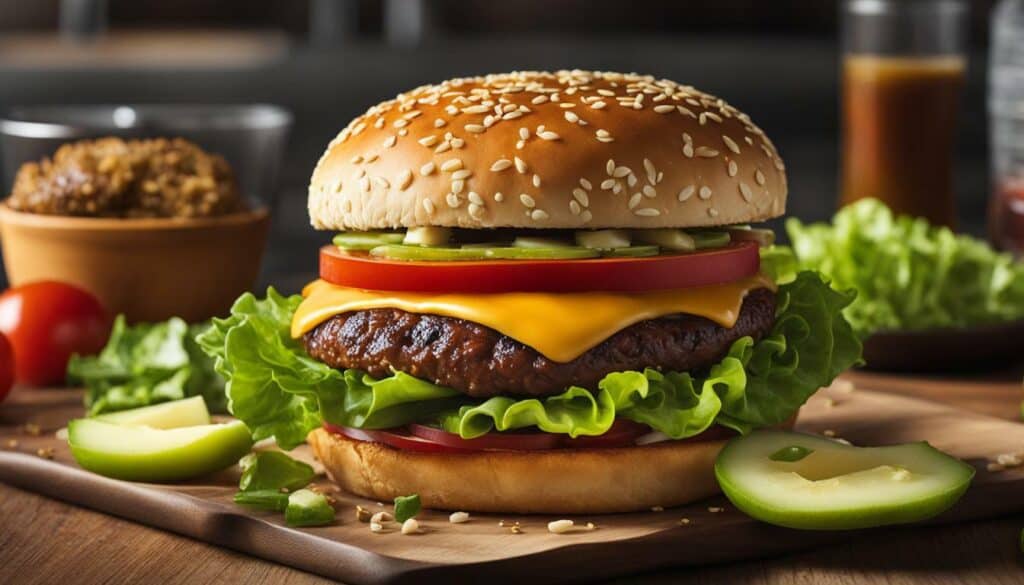Welcome to our friendly guide on cheeseburger calories with bun! If you’ve ever wondered about the nutritional content of this classic American favorite, you’ve come to the right place. In this guide, we’ll break down the calorie content, macronutrient composition, and additional nutritional benefits of a cheeseburger with bun. Plus, we’ll explore variations in calorie counts and provide some key takeaways to help you make informed choices. Let’s dive in!
- A cheeseburger with bun contains approximately 317 calories.
- 42% of the calories come from fat, 36% from carbohydrates, and 22% from protein.
- The cheeseburger provides essential vitamins and minerals like calcium, iron, and vitamin D.
- Calorie counts may vary based on serving size and preparation method.
- Consult specific sources or food providers for detailed nutrition information.
Understanding Cheeseburger Calories
Before we dive into the details, let’s take a closer look at the calories you’ll find in a cheeseburger with bun. A plain cheeseburger on a bun contains 317 calories, with 42% of calories coming from fat, 36% from carbohydrates, and 22% from protein. It has 14.56g of total fat, 6.1g of saturated fat, and 17.25g of protein.
To better understand the nutritional breakdown, let’s explore the macronutrients. Fat is the main contributor to calories in a cheeseburger with bun. With 14.56g of total fat, it provides energy and plays a crucial role in various bodily functions. Saturated fat, found in the cheese and the beef patty, should be consumed in moderation as part of a balanced diet. Carbohydrates, which make up 36% of the calories, provide energy and fiber. Lastly, protein, accounting for 22% of the calories, is essential for building and repairing tissues in our bodies.
It’s important to note that a cheeseburger with bun also offers additional nutritional benefits. It contains vitamins and minerals such as calcium, iron, and vitamin D. These nutrients are essential for maintaining strong bones, transporting oxygen throughout the body, and supporting various bodily functions.
The Importance of Balanced Nutrition
While a cheeseburger with bun can be enjoyed as part of a well-rounded meal, it’s crucial to maintain balance in your overall diet. Incorporating a variety of foods, including fruits, vegetables, whole grains, and lean proteins, ensures that you receive all the necessary vitamins, minerals, and macronutrients. Remember, portion control and moderation are key to maintaining a healthy lifestyle.
| Nutrient | Calories | Percentage |
|---|---|---|
| Total Fat | 14.56g | 42% |
| Saturated Fat | 6.1g | N/A |
| Protein | 17.25g | 22% |
Calorie counts may vary depending on the size of the serving and how the cheeseburger is prepared. To obtain more detailed nutrition information, it is advisable to consult specific sources or contact the food provider directly.

The macronutrient composition of a cheeseburger with bun plays a significant role in its overall calorie count. Understanding the breakdown of fat, carbohydrates, and protein in this classic American dish can help you make informed choices about your dietary intake. Let’s take a closer look at how these macronutrients contribute to a cheeseburger’s nutritional profile.
In a typical cheeseburger with bun, approximately 42% of the calories come from fat, 36% from carbohydrates, and 22% from protein. This balance of macronutrients provides energy and supports various bodily functions.
When it comes to fat, a cheeseburger with bun contains approximately 14.56g of total fat, with 6.1g of saturated fat. While it’s essential to moderate saturated fat intake, it’s worth noting that not all fats are created equal. Some healthier options, such as monounsaturated and polyunsaturated fats, can be found in ingredients like lean meats or avocado toppings.
| Macronutrients | Calorie Percentage | Grams per Cheeseburger |
|---|---|---|
| Fat | 42% | 14.56g |
| Carbohydrates | 36% | – |
| Protein | 22% | 17.25g |
As for carbohydrates, cheeseburgers typically contain a moderate amount, contributing to energy production and providing essential fibers. However, the specific carbohydrate content may vary depending on the brand or recipe.
Lastly, protein plays an important role in muscle growth and repair. A cheeseburger with bun contains approximately 17.25g of protein, making it a reasonable source for meeting your daily protein needs.
It’s important to emphasize that calorie counts may vary depending on factors such as serving size and preparation method. For more detailed nutrition information, it is advisable to consult specific sources or contact the food provider directly.
Fat Content in a Cheeseburger with Bun
Let’s talk about the fat content in a typical cheeseburger with bun and how it contributes to its calorie count. Fat is an essential macronutrient that provides energy and supports various bodily functions. In a cheeseburger with bun, fat accounts for 42% of the total calories.
On average, a plain cheeseburger with bun contains 14.56g of total fat. It is important to note that not all fats are created equal. This cheeseburger also has 6.1g of saturated fat, which is known as the less healthy type of fat. Too much saturated fat in the diet has been linked to an increased risk of heart disease.
To maintain a balanced and nutritious diet, it is recommended to consume fats in moderation. Opting for leaner meat options or even plant-based alternatives can help reduce the fat content in your cheeseburger without compromising on taste. Remember, a well-rounded meal is all about finding the right balance.

| Nutrient | Amount per Serving |
|---|---|
| Total Fat | 14.56g |
| Saturated Fat | 6.1g |
Carbohydrate Content and Bun Calories
Carbohydrates are an essential part of a balanced diet, but how do they factor into the calorie count of a cheeseburger with bun? Let’s take a closer look. In a typical cheeseburger with bun, carbohydrates contribute 36% of the total calories. This means that a significant portion of the burger’s energy comes from carbohydrates.
But what about the bun itself? Many people wonder if the bun adds a significant amount of calories to their cheeseburger. On average, a plain burger bun contains approximately 120 calories. While this may seem substantial, it is worth noting that the bun contributes to the overall taste and texture of the cheeseburger experience.
To give you a better idea, let’s break it down. If we consider a cheeseburger with a bun that has a total of 317 calories, and the bun accounts for 120 of those calories, the remaining 197 calories come from the patty, cheese, and other toppings. This information can be useful for individuals who are mindful of their calorie intake and want to make informed choices about their meals.
So, while the bun does add some calories to a cheeseburger, it is not the sole factor contributing to the overall calorie count. It’s important to strike a balance and consider the nutritional value and enjoyment that a bun brings to your cheeseburger experience.

| Nutrient | Percentage of Calories |
|---|---|
| Fat | 42% |
| Carbohydrates | 36% |
| Protein | 22% |
“The bun contributes to the overall taste and texture of the cheeseburger experience.”
Incorporating a Balanced Diet
When enjoying a cheeseburger with bun, it’s important to consider the overall composition of your meals. While the burger may not be the epitome of a health food, it can still be part of a balanced diet when consumed in moderation and alongside nutrient-rich foods.
By including a variety of fruits, vegetables, and whole grains in your diet, you can complement the cheeseburger’s macronutrient profile. This diverse eating approach ensures that your body receives an array of vitamins, minerals, and other essential nutrients for overall health.
- Pair your cheeseburger with a side of leafy greens or a fresh salad to boost the fiber and nutrient content of your meal.
- Consider opting for whole wheat buns instead of white buns to increase the fiber content and add more nutritional value.
- Experiment with adding healthy toppings such as avocado, tomato, or grilled vegetables to enhance the flavor and nutritional profile of your cheeseburger.
Remember, balance is key. While it’s perfectly fine to enjoy a cheeseburger with bun occasionally, incorporating a variety of nutrient-dense whole foods into your daily diet is essential for optimal health.
So, the next time you savor a delicious cheeseburger with bun, know that carbohydrates play a significant role in the calorie count, but with mindful choices and a well-rounded diet, you can still enjoy this classic treat while nourishing your body.
Protein Power in a Cheeseburger
Protein is a vital nutrient, and a cheeseburger with bun offers a significant amount to support your dietary needs. In a typical cheeseburger with bun, you’ll find approximately 17.25g of protein. This macronutrient plays a crucial role in repairing and building tissues, supporting immune function, and providing energy for your body. Incorporating protein into your meals is essential, and a cheeseburger with bun can be a delicious way to do so.
Not only does the protein in a cheeseburger with bun contribute to your overall nutrition, but it also helps you feel satiated and satisfied. Protein takes longer to digest than carbohydrates, which means it can help control your hunger and prevent overeating. By including a balanced amount of protein in your diet, you can maintain a healthy weight while still enjoying your favorite foods.
When it comes to protein intake, it’s important to consider your individual needs and goals. The Dietary Guidelines for Americans recommend consuming 10-35% of your total daily calories from protein. This range allows for flexibility and customization based on factors such as age, sex, activity level, and overall health. Consulting a healthcare professional or registered dietitian can help you determine the right protein intake for you.

In summary, a cheeseburger with bun can provide a significant amount of protein to support your dietary needs. With approximately 17.25g of protein, it offers a delicious and satisfying way to incorporate this essential nutrient into your meals. Remember to consider your overall protein intake based on your individual needs and consult a healthcare professional for personalized nutrition advice.
Additional Nutritional Benefits
Besides calories and macronutrients, a cheeseburger with bun also provides your body with essential vitamins and minerals. These nutrients play a crucial role in supporting overall health and well-being. Let’s take a closer look at some of the key nutritional benefits you can derive from including a cheeseburger with bun in your diet.
One of the notable vitamins found in a cheeseburger with bun is calcium. Calcium is essential for maintaining strong bones and teeth. It also plays a vital role in muscle function and nerve transmission. Incorporating a cheeseburger into your meal plan can help you meet your daily calcium requirements, especially if you pair it with a slice of cheese.
Iron is another vital mineral found in cheeseburgers. Iron is responsible for carrying oxygen throughout the body and supporting the production of healthy red blood cells. Including a cheeseburger with bun in your diet can help prevent iron deficiency and associated symptoms like fatigue and weakness.
Lastly, cheeseburgers with bun can also provide a good source of vitamin D. This vitamin is not naturally present in many foods but is essential for bone health as it aids in the absorption of calcium. Additionally, vitamin D plays a role in supporting a healthy immune system and may have other potential benefits for overall health.

| Nutrient | Amount per Serving |
|---|---|
| Calories | 317 |
| Total Fat | 14.56g |
| Saturated Fat | 6.1g |
| Protein | 17.25g |
It’s important to note that the nutritional content of a cheeseburger with bun may vary depending on the size and preparation method. These figures serve as a general guide and may differ based on individual variations. For more detailed information or specific questions about a particular cheeseburger, it’s always best to consult reliable sources or reach out to the food provider directly. By understanding the nutritional benefits of a cheeseburger with bun, you can make informed choices and enjoy this classic meal as part of a balanced diet.
Variations in Calorie Counts
It’s important to note that calorie counts for cheeseburgers with bun may vary, depending on different factors that we will discuss in this section. Factors such as the serving size, cooking methods, and additional toppings can significantly impact the overall calorie content of a cheeseburger. To help you make more informed choices about your burger indulgence, let’s explore these variations in more detail.
Serving Size
The size of the cheeseburger can greatly affect its calorie count. A standard cheeseburger typically weighs around 120-150 grams and contains approximately 317 calories. However, larger burgers or specialty burgers with multiple patties or extra toppings can easily exceed 500-600 calories or more. If you’re watching your calorie intake, opting for a smaller-sized burger or choosing a single patty instead of multiple patties can help keep the calorie count in check.
Cooking Methods
The cooking method can also impact the calorie content of a cheeseburger. Grilling or broiling the burger is generally considered healthier compared to frying, as it reduces the amount of added fats and oils. Additionally, avoiding excessive use of oil or butter during the cooking process can help lower the overall calorie count. It’s always a good idea to check with the restaurant or food provider for information on their specific cooking methods and whether any additional fats or oils are used.
Toppings and Condiments
While the basic cheeseburger is relatively low in calories, the addition of toppings and condiments can significantly increase its calorie content. Popular burger toppings such as cheese, mayo, ketchup, and bacon can add extra calories, fat, and sodium. For a healthier option, consider adding fresh vegetables like lettuce, tomato, and onion, which provide added nutrients without significantly increasing the calorie count. Opting for lower-calorie condiments or enjoying the burger without any additional sauces can also help keep your calorie intake in check.
| Topping | Calories (per serving) | Total Fat (grams) |
|---|---|---|
| Cheese | 100 | 9 |
| Mayo (1 tablespoon) | 90 | 10 |
| Ketchup (1 tablespoon) | 20 | 0 |
| Bacon (2 slices) | 92 | 7 |
By being mindful of these variations in calorie counts, you can still enjoy a delicious cheeseburger with bun while making choices that align with your dietary goals. Remember, moderation is key, and incorporating regular exercise and a balanced diet into your lifestyle can help maintain a healthy and enjoyable relationship with food.

Can the Guide for Counting Calories in a Hamburger Steak be Applied to a Cheeseburger with a Bun?
When it comes to counting calories in hamburger steak, applying the same guide to a cheeseburger with a bun might not yield accurate results. The addition of a bun and cheese can significantly alter the calorie content, making it necessary to consider them separately. While the original guide may provide a starting point, taking into account the extra ingredients is crucial for an accurate calorie count.





Leave a Reply